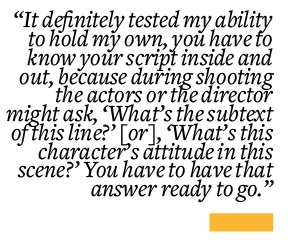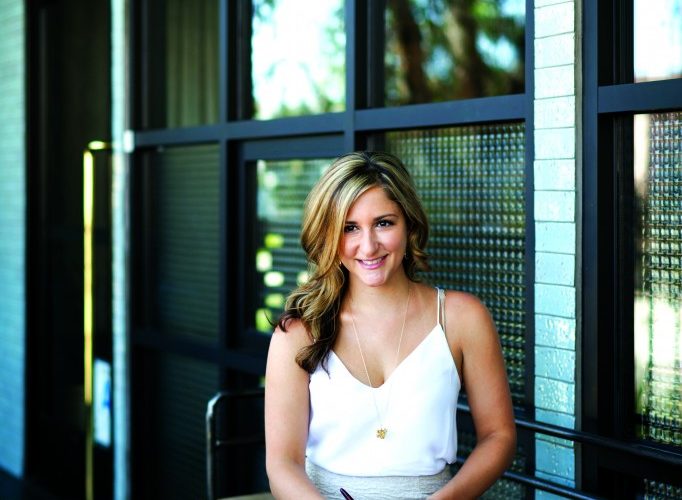Local talent Tia Napolitano takes Los Angeles by storm, then ends up on a grey Seattle set.
If you’ve ever been curious about who writes those funny lines or dramatic conversations that you hear on your favorite TV shows, you will now be able to see writers discuss the process on the Sundance Channel’s The Writers’ Room, which first aired July 28, 2013. In a recent Boston Globe article about the show, reporter Matthew Gilbert wrote: “The most acclaimed shows of our time…have been driven almost exclusively by writers with distinct and original visions. Without these people, the ‘quality TV’ revolution in recent years wouldn’t have occurred.”
The North Shore is home to one such TV writer, who recently had her first episode for Grey’s Anatomy aired on ABC. Tia Napolitano—who was born in Winchester, grew up in Medford and Newburyport, and graduated from Brooks School in 2002—describes how her love of writing led her to overcome a major obstacle and land a writing position that has her working on behalf of Shonda Rhimes—the acclaimed writer-producer of the hit series.
One of the scariest yet most exciting days in Napolitano’s career occurred while she was working as a writers’ assistant for Grey’s Anatomy. She’d written a freelance episode and had to watch as the actors read the script aloud, scene by scene, to gauge if they were laughing at her jokes and tearing up in the appropriate places.
In a spacious rehearsal hall on a studio lot, Napolitano found herself staring into the faces of Grey’s Anatomy’s stars, along with its creator-executive producer, department heads, and seasoned writers. “You’re writing lines for people who have been playing a character for nine years,” says Napolitano. “I was a huge fan of the show in college, and now I’ve been given the opportunity to write for those characters.”
The reading was a success and the script became Episode 12 of Season Nine, which aired last January.
Not only did her script result in a televised episode, it also led to a phone call from the producer. Rhimes, who recently appeared on Time’s 2013 list of the 100 most influential people in the world, called Napolitano to offer her a promotion to staff writer. “Shonda is definitely a hero of mine,” says Napolitano. “I was even excited when I was an assistant and she learned my name. So when she first called me and said she wanted to bring me on staff full-time, [it] was a life milestone. It was one of the best phone calls of my life.”
Napolitano’s road to Hollywood and promotion to ABC staff writer began with a writing foundation she built while a student at Brooks School in North Andover. Napolitano developed her love of writing by taking numerous English courses in which she studied everything from Shakespeare to journalism. She also gained experience in the world of theatre, which directly impacts her ability to work in television. For her senior project, she spent a semester studying the work of playwright, actor, and director Sam Shepard. She then had the opportunity to choose a short play to produce at Brooks’ Vanoff Black Box Theater. Later, Napolitano moved to Washington, D.C., where she worked as a press office intern for Senator John Kerry. Eventually, she moved back to Massachusetts and became an assistant stage manager for a play titled A New War, which was performed at Jimmy Tingle’s Off Broadway Theater in Somerville. Ultimately, Napolitano returned to school and studied print journalism and English literature at NYU from which she graduated in 2007.
While trying to figure out what kind of job would incorporate her passion for writing and producing plays, she decided “on a whim” to take a broadcast journalism internship at ABC News. “I was always interested in theatre and acting, which [are] a lot like television, and that led to my first full-time TV job,” she says. “I worked for The Montel Williams Show as a field production assistant and still had no idea what I wanted to do. Then, I decided to go for it, and I moved to Los Angeles to get into scripted television. It wasn’t a job you think you might get when you graduate from high school—a TV writer. You might as well say ‘astronaut.’”
When Napolitano arrived in Los Angeles in 2009, she started her first job at a talent and literary agency, ICM Partners. “That was a great way to break into TV writing and learn the business inside and out,” says Napolitano. She worked as an assistant to TV literary agent Mark Gordon, who now represents her. Napolitano stayed at that job for eight months, until a position as a writers’ personal assistant opened up at Grey’s Anatomy. As an assistant during Season Six, she brought the writers coffee, went grocery shopping, and essentially acted as a gofer, she says, “just like all the Hollywood cliches.”

Next, Napolitano was promoted to writers’ assistant, which enabled her to sit in the writers’ room and transcribe every word they said. Her fingers hurt a lot, she recalls. Now, as a staff writer, she sits in that same room, which is typically filled with eight to ten writers, who discuss the show from about 9:00 a.m. until 6:00 p.m. every day.
The Grey’s episode that Napolitano wrote,”Walking on a Dream,” was filled with all the usual drama. The character Arizona battles phantom leg syndrome—the condition of having sensation in an amputated limb— which agitates her continuously, and doesn’t stop until she demands that Karev stab her prosthetic foot with a scalpel in the middle of surgery. Elsewhere in the hospital, a physician advisor appears in the ER, posing as a patient to anonymously measure the unit’s efficiency. Eventually, she makes the shocking declaration to the senior doctors: “I am proposing that we close your ER.”
The process of writing an episode takes months and is a group effort, explains Napolitano. Staff writers each script anywhere from one to four episodes per season. Each writer receives a daily e-mail with the “the medical-medical of the day,” which contains cutting-edge medical ideas and actual patient stories. Often, specialized surgeons will speak to the writers and shed light on what it’s like to be in the operating room holding a scalpel, for example. The writers glean information about strange and dramatic scenarios that have really happened. Sometimes, writers attend actual surgeries so they can experience the environment. They can also tap into the expertise of a researcher/writer and doctor/writer on staff.
“For my episode,” says Napolitano,”we were introducing a new character, a physician advisor, so there was a lot of discussion about who she was, what her background was, and how we were going to introduce her.”
Napolitano explains the process in full: “The writers pitch ideas, and the group says how they feel about the ideas. They’re all very supportive, really smart people. No one ever says, ‘That idea is stupid.’ They might say, ‘Let’s go in another direction.’ That process of formulating the episode goes on for about two weeks. Once stories are set from start to finish, and the scenes [have been determined], the writer goes off [alone] to write the outline in explicit detail. Then, [supervisors], head writers, and the show runner approve [it] and [the script is written]. It goes through many more drafts….It’s like an English paper needing revision, so it’s painful, but the end result is so much better.” It takes about two months to complete an episode—from the beginning of the writing process until it has been shot. The writer works hand-in-hand with the episode’s director during a shoot that typically lasts about 10 days. The on-set writer helps shape each scene to make sure the tone of what’s shot matches what’s written.
“It definitely tested my ability to hold my own,” says Napolitano. “You have to know your script inside and out, because during shooting the actors or the director might ask, ‘What’s the subtext of this line?’ [or], ‘What’s this character’s attitude in this scene?’ You have to have that answer ready to go.”
During the process of creating an episode, everything continuously changes until it airs on TV. “You can’t get too attached,” explains Napolitano. “I have a pretty thick skin. I think it comes from being a writing student in high school and a journalism/English major in college. Everything can always get better, so the less attached you are and the more open you are to other opinions and edits and notes, I think the better your end product will be—especially for my first episode.”
But even though it’s Hollywood, the work isn’t always glamorous. “It isn’t easy,” she adds. “It’s fun, [but it’s] hard work. You have to be on 100 percent every single day, for sure. You always want to be contributing concise, helpful ideas to drive the story forward.”
In order for Napolitano to successfully create scenes about hospital drama and detailed surgeries, she had to overcome a major obstacle of her own—lifelong phobia of doctors, needles, and hospitals. The fear is understandable. At age two, she was diagnosed with stage four neuroblastoma, a rare type of childhood cancer.
“All of the kids who had been diagnosed [with the same disease] before me, who followed this specific treatment protocol, had died,” she explains. “It definitely shaped my whole life. Throughout my childhood, I had to go through follow-up visits to track my health progress and see if there would be any relapses. So I grew up hating doctors and even the smell of soap in hospitals.” Although she did always love watching Grey’s Anatomy, she had to fast forward or close her eyes during the surgeries. She worked hard to overcome her fear. As a result, her career and life paths are punctuated with high points. One such high point occurred a few days before her first episode was to air. Her boyfriend had invited her out to dinner and, as a surprise, brought her to the Soho House in West Hollywood—a trendy club with a private screening room. He had obtained a copy of her episode and invited 30 of her friends to watch it. It was the first time she saw the “final air” version with its finishing touches, such as color correction and music.
“It was very fun to watch,” enthuses Napolitano. “I got to [watch] it in a room full of people who had never seen it before, so it was funny to see what got a laugh, what got a gasp, how people reacted to it. It was really great to enjoy it with TV viewers for the first time. It was exactly how I would have wanted the night to be.”
The TV screening wasn’t the only excitement of the night. After the show, her boyfriend called her to the front of the room and, in front of all her friends, asked her to marry him. She said yes.
If Napolitano were writing a script for her path to becoming an ABC writer, she would probably not revise it at all.

